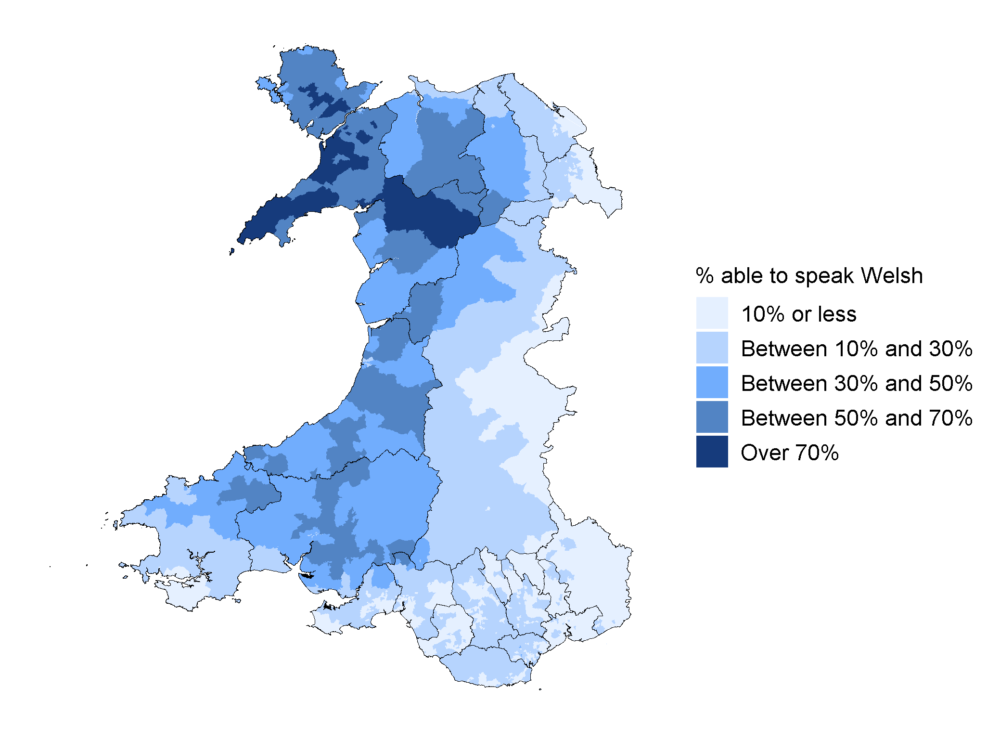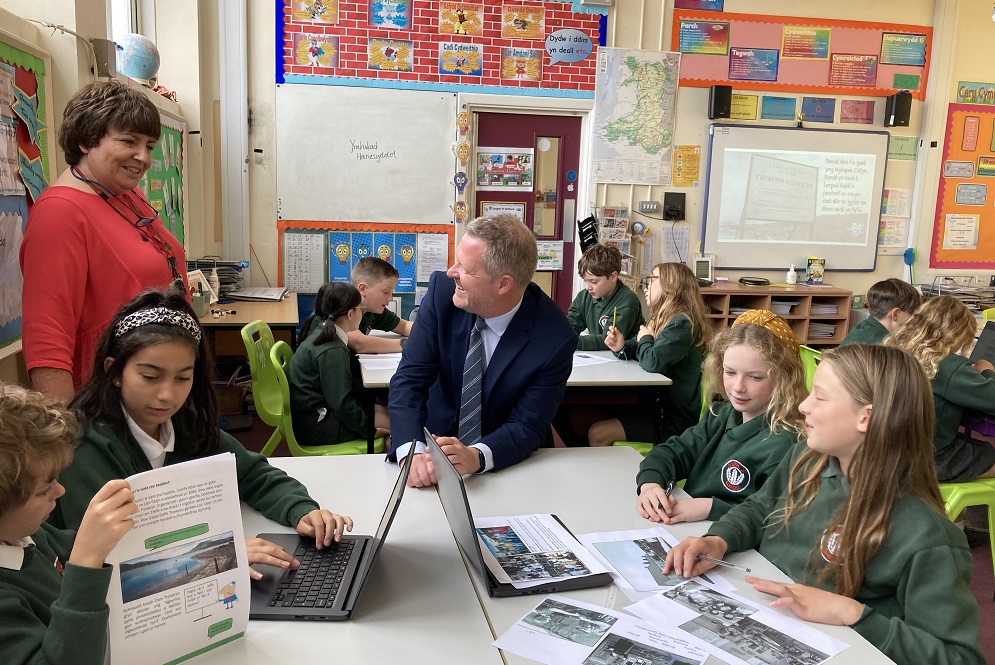The Welsh Government must focus more on language attitudes

Meilyr Jones, Language Attitudes Research Team, Bangor University
The Welsh Language Use Survey data shows low rates of language use among Welsh-speaking adults.
This is a particular area of concern in government policy, as the Cymraeg 2050 strategy aims to double the percentage of daily use of Welsh.
The reluctance to use Welsh illustrated here is also reflected in decreasing intergenerational family transmission, a domain that is possibly the single most important contributor to the survival of a language.
Research has highlighted that the government’s over-reliance on education as a language revitalisation tool, without initiatives addressing language use, especially in the family, could lead to a situation similar to the one facing Irish.
Importance of attitudes
Revitalizing a minority language must encompass shifting language attitudes.
While policy makers behind the current Welsh Government language strategy Cymraeg 2050 identify “normalising perception and use” as a key challenge to be addressed, the Cymraeg 2050 strategy does not discuss the need to improve attitudes per se.

Nevertheless, attitudes play a central role in successful language maintenance, which is why we believe that more focus must be put on improving language attitudes in Wales.
In our research, we explored the relationship between explicit and implicit language attitudes and exposure towards Welsh in north-west Wales.
Comparing speaker background data from the Language and Social Background Questionnaire with results from the Attitudes towards Languages (AToL) Scale and an Implicit Association Task.
The Role of Early exposure
Our results show that speakers hold more favourable explicit attitudes towards Welsh than English.
Therefore, contrary to the current landscape of declining use and exposure towards Welsh in Wales, bilingual speakers’ explicit attitudes towards Welsh remain positive.
Speakers with higher exposure to Welsh at primary school age have more favourable attitudes towards Welsh than those with lower exposure who favour English.
These results show the importance of language exposure in fostering positive implicit attitudes towards Welsh.
Our results suggest that early exposure may do more than give children the necessary language skills required for use — a role which education, too, can successfully fulfil.
What early exposure may be providing above and beyond language skills is the modelling of Welsh language practice in a broad range of community contexts.
This tallies with research in other areas — such as physical activity and sleep patterns — where behaviour modelling has been found to play a fundamental role in influencing children’s behaviour.
Implications
The lack of modelling that some children experience is therefore particularly pertinent when considering the context of declining exposure to Welsh due to a decrease in social use and intergenerational family transmission.

Considering the Welsh Government’s current target to double the use of Welsh in areas such as the workplace and social situations, this suggests that arresting the decline of social use of Welsh and, in particular, intergenerational transmission within the family, is critical for improving implicit attitudes towards Welsh and should be considered a priority for Welsh Government language policy.
Doing this in areas such as north-west Wales that are currently undergoing language shift ought to be of utmost importance to policymakers.
If current patterns of decline continue, a decrease in exposure could lead to less favourable implicit attitudes towards Welsh, thus highlighting the importance of home and community exposure for the future vitality of Welsh.
Improving implicit attitudes towards Welsh is significant from a language revitalisation perspective as implicit attitudes seem to be better predictors of habitual behaviour than explicit attitudes, that is, how likely the speaker is to use the language.
Therefore, we suggest that implicit attitudes and their potential impact on use should receive more attention by Welsh researchers and policymakers alike.
Future work on language attitudes should include both direct and indirect methods, particularly in other areas of Wales where exposure towards Welsh is lower, and in the assessment of language vitality in general.
Find out more about Bangor University’s Language Attitudes Research Team here.
Support our Nation today
For the price of a cup of coffee a month you can help us create an independent, not-for-profit, national news service for the people of Wales, by the people of Wales.





‘The Welsh Language Use Survey data shows low rates of language use among Welsh-speaking adults.’ Certainly this appears, anecdotally, to be considerably true around where we live, on the eastern side of y Dyffryn Clwyd. Quite a high proportion of people here are able to speak Welsh, but nevertheless English is very much the normal language of day-to-day discourse. But that seems, again anecdotally, to be rather less the case on the other side of the vale, where Welsh seems to be more routinely used – even though these places are less than ten miles from where we’re living. We seem to… Read more »
It’s hard to disagree with this, once one has worked out what it actually says. But what to do about it? I hope practical policy prescriptions will be forthcoming.
Incidentally I’ve mentioned here before the lack of encouragement for using Welsh in everyday life, citing the absence of Welsh-language menus in cafés and restaurants. So I’m pleased to report I came across one last week, at Pantri Blakeman in Blue Street, Carmarthen – though I haven’t had a chance to dine there yet.
Go there. A wholly Welsh experience. Food is lovely too.
Diolch! Will do!
As an aside I would like to see more classes free of charge to learn the Welsh language. Maybe held in council hubs. None in Cardiff
The report states the obvious. Of course more language exposure increases the attitude towards the language. That’s a no-brainer. It misses the elephant in the room though, or rather, refuses to deal with it, namely: that a language, particularly a minority (or minoritized!) language must have a geographical base. The Fro Gymraeg is hemorrhaging, and as a result, Welsh looses its status as the dominant community language, and intergenerational language transmission weakens. The reasons are numerous and complex, for example – idolization of tourism and under investment in other sectors such as social enterprises; house-building as an ideology (that all… Read more »
100% correct. Even now the language as a community language could be saved, just about. That, however, would require some considerable political will. Not a hope.
Exactly, the government are seeing out of peoples past and future for a quick buck. They are of-course doing it because they have one hand tied behind their back by Westminster. We are exactly where they like us! At the end of the table on our knees grovelling.
This is an issue over & over with Cymraeg. Endless talking. Welsh even has a verb for committee (pwyllgora). If you want to survive stop making committees for everything and get busy
Another glaring point is the open abuse that we can receive for speaking Welsh. I live in a border town, and I’ve been learning Welsh for 3 years. There have been numerous occasions this year alone where I’ve been conversing with someone only to hear “why don’t they respect our culture and learn our language” or a favourite comment seems to be “it sounds like they’re clearing their throats”. Our local community page on Facebook recently had someone complaing that Aldi supermarkets do their tannoy announcements in Welsh first. Issues like this need stamping out, but I’m sceptical that any… Read more »
The Welsh flag features a beautiful red dragon. Red dragons are exclusive to Wales, and everybody knows that these dragons only speak Welsh, so if you wish to communicate with a dragon, you must speak to it in its own language. If I had known this when I was a child in the non-Welsh speaking part of Wales, I would have been desperate to learn and use Welsh – not for pragmatic purposes, not for transactions (which is what most current learning materials focus on), but because Welsh is magical, cool, special. Just as Japan has Manga, which draws in… Read more »
Quite correct! Unfortunately, there has been a “self loathing” bred into the Welsh that helps prevent some people, even using the Welsh they have.
This will take time and effort to remove.
Couldn’t agree more – I don’t think I have ever come across another people whom seem to care more for the opinion of a foreign people than that of a future for theirs
Agree, we can’t though because the only time anything from Wales gets to leave this island. its only ever with the permission of English first and that’s even if it remains true to Wales. A lot of it gets anglicised to the point it being unrecognisable and past of as being English in origin.
When you find out how much wales contributes go recent Hollywood movies, but isn’t allowed a mention in the credits it kind of hits home.
It strikes me that much of the problem is that many of us aren’t proud of our language and our ability to speak it, and though we may have the legal right, in limited contexts, to receive services in Cymraeg, in practice this is often a very frustrating experience. There is also a kind of belief, and almost unconscious acceptance among a sizeable proportion of the population that Cymraeg is somehow less respectable than English. I’m not talking here of those of us educated and who have been activists at some point in our lives, but ordinary speakers of Cymraeg… Read more »
And why pray tell would they do that? It’s all lip service, that’s all it’s ever been. They consistently blow their cover when they refuse to put in safeguards in regards to preserving native place names. and look how they side with companies who skirt the laws that were supposedly put in place to protect the language.
The other major contributing factor that no one dares address is how prevalent English is in our entertainment. What is the point of learning our language when the majority we then go on to consume is all in English! It defeats the point completely. The only way the trend reveres is if someone has the bottle to put their foot down and demand a cap on English language programming. And let’s be honest, that will never happen for fear of being called anti-English, in reality it shows nothing more than the efforts to recover the footing of OUR Language.
Welsh is one of thousands of languages across the world being put aside in daily businesses and day-to-day interactions between family members and in communities. This can be for reasons of inclusion, when others only speak or understand English. However, I think some of this might also come from the expectation that everyone is to speak English in business. Why is this? As a mine engineer and, given the nature of where commodities are located, many video calls and face-to-face meetings are conducted with people who do not have English as a first language. The decent and empathetic thing to… Read more »